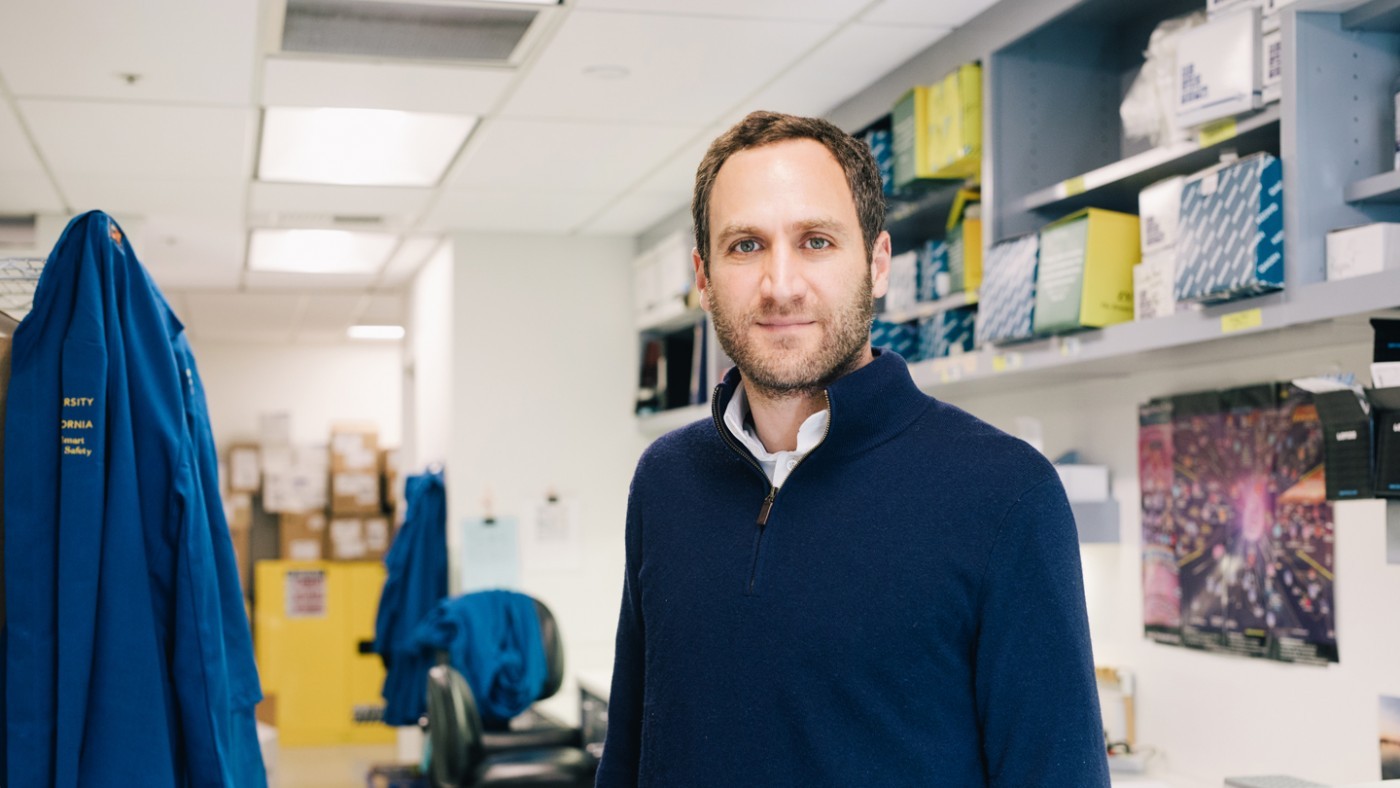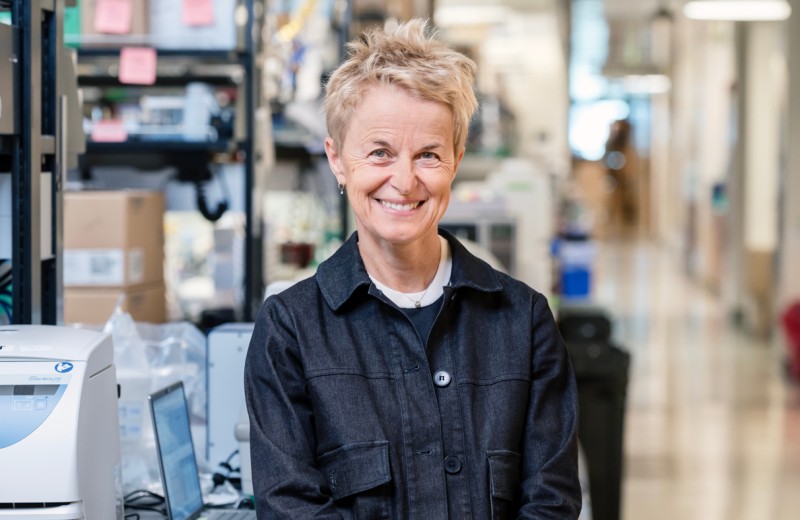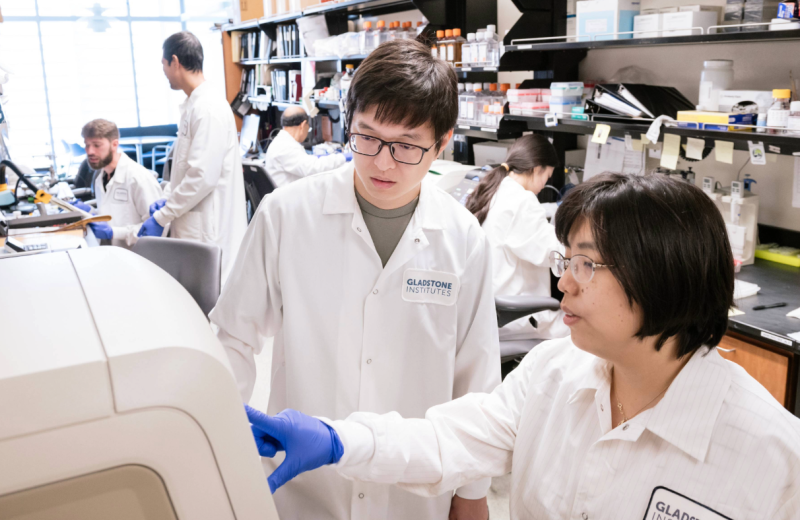Gladstone NOW: The Campaign Join Us on the Journey✕

Alexander Marson will be leading the new Gladstone-UCSF Institute of Genomic Immunology. Credit: Anastasiia Sapon
It’s not science fiction. Scientists today can take cells from a human blood sample and reprogram them to behave the way they want, almost at will. Doctors can then transfer the modified cells into patients to treat disease. This is how CAR-T cells work, for example. Now a standard of care for certain types of cancer, this treatment involves changing immune cells in the lab to make them attack cancer cells in the body. But the potential for this approach to impact human disease goes far beyond cancer.
Alexander Marson, MD, PhD, has long been inspired by the use of such genetically modified cells as a new class of “living medicines.”
When he started his own lab at UC San Francisco (UCSF) in 2013, he already knew he wanted to study how DNA controls the behavior of cells in the human immune system and develop new ways to target these cells to treat disease.
“At the time, we didn’t have a good tool to do these studies,” recalls Marson, who was recently appointed to lead the new Gladstone-UCSF Institute of Genomic Immunology. “However, CRISPR had just been discovered and allowed us for the first time to make specific changes to DNA with relative ease. I thought this could be the engine to understand how the human genetic code controls immune cell function, and the tool to actually engineer immunotherapies.”
Marson had been recruited into the UCSF Sandler Fellows Program, which helps exceptionally promising young scientists establish independent research labs. Before that, he had trained as a graduate student at the Massachusetts Institute of Technology under the mentorship of Rick Young and Rudolf Jaenisch, a pioneer in reprogramming cells. He also obtained his medical degree at Harvard Medical School and completed his final year of clinical work as an infectious diseases fellow at UCSF.
Serendipitously, shortly after Marson started his lab, he was introduced to Jennifer Doudna, PhD, who co-discovered the CRISPR system and its potential for genetic engineering. They teamed up to make advances in CRISPR and apply them to actual human immune cells.
“That was a turning point in my research,” says Marson.
To this day, Marson and Doudna continue to collaborate closely as they are both part of the leadership team at the Innovative Genomics Institute, which brings together diverse researchers from UCSF, UC Berkeley, and Gladstone Institutes.
“Alex is committed to advancing the field of cell-based therapies,” says Doudna, a senior investigator at Gladstone, as well as a professor at UC Berkeley. “He takes an ambitious approach to research and he’s highly collaborative. I always appreciate the unique insights that come from his clinical mindset.”
A New Institute to Unite Converging Fields
Marson’s work is based on the principle of taking human immune cells out of a blood sample, and then using CRISPR directly in the cells to find a targeted piece of the DNA code and reprogram it. With this approach, scientists can reprogram a cell by removing a piece of DNA, fixing a gene that contains a patient mutation, or even adding in new synthetic code.
The goal of making these changes is to dictate how cells behave. For instance, scientists could make cells better at finding tumors or clearing cancer cells once they find a tumor, program cells to better suppress inflammation associated with autoimmune diseases (such as diabetes, multiple sclerosis, or rheumatoid arthritis), or even engineer cells to treat infectious diseases that are currently untreatable.
But Marson cannot achieve this alone.
“The impetus to start the new Gladstone-UCSF Institute of Genomic Immunology was the realization that we’re in a moment where a number of rapidly advancing fields are starting to converge in ways that are too big for any single lab to take on,” says Marson, who is both a senior investigator at Gladstone and an associate professor in the Departments of Medicine and Microbiology and Immunology at UCSF. “We need to bring people together around the shared goal of understanding the genetic control of human immune cells and developing novel cell-based immunotherapies.”
“When CRISPR gene editing was invented, I was struck by the possibility that it would open up new worlds of biology, but the reality so far has exceeded even my highest expectations. Things are just becoming possible that, when I started my lab, were beyond imagination.”
Specifically, Marson is referring to advances in sequencing, stem cells, and gene editing, that together open the door to synthetic biology. Sequencing technologies and new computational approaches allow researchers to fully understand the building blocks of the human genome, while CRISPR gene editing provides them with the ability to not only read the DNA code, but also rewrite it. In addition, they can manipulate the code in stem cells to engineer all human cells for myriad uses. This type of synthetic biology is an emerging field that enables scientists to move beyond the genome’s natural sequences by writing new code to introduce complex behaviors into cells and allow them to respond to their environment in pre-determined ways.
“Each of those fields is interesting in its own right, but when they come together in service of cell therapies, we can imagine transformative opportunities for how to treat patients in the future,” adds Marson.
Marson is launching the new institute so these areas can cross-fertilize in a way that will accelerate progress.
“A major incentive for creating an institute with a strong nucleus at Gladstone is its commitment to creating an innovative environment that’s fertile for science,” says Marson. “We can bring cutting-edge innovations in gene editing side-by-side with people thinking about immunology and synthetic biology to maximize our impact.”
Collaboration, he says, will be the key to success.
That’s why this institute is the first to be created as a partnership between Gladstone and UCSF. As such, it will draw on UCSF’s strengths in immunology, patient populations, synthetic biology, and human genetics, as well as Gladstone’s deep expertise in cellular reprogramming and gene editing.
“This is an unprecedented partnership between Gladstone and UCSF,” says Gladstone President Deepak Srivastava, MD. “Our aim is not only to combine genomics and immunology, but to do so as seamlessly as possible across the two institutions to encourage the flow of ideas and information while increasing everyone’s access to the best equipment and technology.”
The institute will have lab space at Gladstone, adjacent to UCSF’s Mission Bay campus, as well as at the University’s Parnassus Heights campus, creating a unified community across the two campuses.
“Cell therapies are among the most exciting and promising developments in medicine, and we’re proud that the first-ever Gladstone-UCSF institute, under Alex’s able leadership, will advance these ‘living medicines,’” said UCSF Chancellor Sam Hawgood, MBBS. “UCSF’s long-standing partnership with Gladstone leverages the best of both institutions, and this joint institute will combine each institution’s strengths in immunology and gene-editing technologies in new and powerful ways.”
Beyond the two institutions, Marson will foster collaborations throughout the San Francisco Bay Area to accelerate efforts that are already underway and shorten the paths to new discoveries and treatments.
“There’s fantastic talent and diverse expertise in the Bay Area that will inform the next generation of cell therapies,” he says. “We will weave people together who are already here and recruit leaders from around the world to further supercharge this incredible environment.”
Collaboration isn’t new to Marson, who is also a Chan Zuckerberg Biohub Investigator and a member of the Parker Institute for Cancer Immunotherapy. It’s a philosophy at the core of his approach to science.
“It’s the most fun way to do science, and it also has the advantage of being much more effective for the types of science that I’m interested in,” explains Marson. “Old questions are being answered through newly available tools, but no one scientist can have all the necessary expertise. So, when you bring together labs from different areas of biology—or even outside biology—and incentivize joyful collaboration, I think the results can be truly remarkable.”
Marson’s approach and vision are two of the reasons he was selected to lead the new Gladstone-UCSF Institute of Genomic Immunology.
“Alex has distinguished himself worldwide and has quickly emerged as one of the most creative scientists using advanced genomic approaches to dissect and manipulate the immune system,” says Srivastava. “His broad vision will undoubtedly lead to new cell therapies that will improve the quality of people’s lives. It is quickly evident when talking with Alex that he is the future of science.”
When Marson first started his scientific career, he could not have envisioned where he is now.
“Editing genes in the immune system as a way to treat disease wasn’t really conceivable at the time,” he recalls. “When CRISPR gene editing was invented, I was struck by the possibility that it would open up new worlds of biology, but the reality so far has exceeded even my highest expectations. Things are just becoming possible that, when I started my lab, were beyond imagination.”
“Knowing how far we’ve come in such a short time gives me great optimism that if we continue to nurture and create infrastructure for innovation, we will achieve unimaginable feats in the coming years,” says Marson.
Support Our COVID-19 Research Efforts
Gladstone scientists are moving quickly to respond to the coronavirus outbreak. Help us end this pandemic.
One Person’s Final Gift to Science Gets Us Closer to an HIV Cure
One Person’s Final Gift to Science Gets Us Closer to an HIV Cure
A new documentary follows Jim Dunn’s end-of-life decision to donate his tissues to HIV research.
Institutional News HIV/AIDS Infectious Disease Roan LabBeyond Viruses: Expanding the Fight Against Infectious Diseases
Beyond Viruses: Expanding the Fight Against Infectious Diseases
The newly renamed Gladstone Infectious Disease Institute broadens its mission to address global health threats ranging from antibiotic resistance to infections that cause chronic diseases.
Institutional News News Release Cancer COVID-19 Hepatitis C HIV/AIDS Zika Virus Infectious DiseaseFueling Discovery at the Frontiers of Neuroscience: The NOMIS-Gladstone Fellowship Program
Fueling Discovery at the Frontiers of Neuroscience: The NOMIS-Gladstone Fellowship Program
The NOMIS-Gladstone Fellowship Program empowers early-career scientists to push the boundaries of neuroscience and unlock the brain’s deepest mysteries.
Institutional News Neurological Disease Mucke Lab NOMIS



